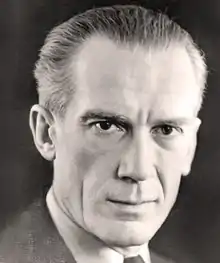Leo Borchard
Lew Ljewitsch "Leo" Borchard (31 March 1899 – 23 August 1945) was a German-Russian conductor and briefly musical director of the Berlin Philharmonic.

Biography
Borchard was born in Moscow to German parents, and grew up in Saint Petersburg where he received a solid musical education, as well being a regular visitor to the Stanislavsky Theatre. In 1920, after the Russian Revolution, he emigrated to Germany. Otto Klemperer engaged him as his assistant at the Kroll Opera in Berlin (Klemperer, lacking confidence in his own abilities, expected Borchard to critique his conducting technique).[1] He conducted the Berlin Philharmonic for the first time in January 1933. In 1935, he was banned by the Nazi regime as politically unreliable. He continued teaching at his apartment and received his friends, including Boris Blacher and Gottfried von Einem.[2]
During World War II he remained in Berlin as a Resistance activist under the name Andrik Krassnow, during which time his duties included contact with Ludwig Lichtwitz, a specialist in false identity papers.
_Leo_Borchard.jpg.webp)
On 26 May 1945, two and a half weeks after Germany's unconditional surrender, he conducted the Berlin Philharmonic at the Titania Palast cinema, in a concert featuring the Overture to Mendelssohn's A Midsummer Night's Dream, Mozart's Violin Concerto in A major and Tchaikovsky's Symphony No. 4, to great public acclaim.[3] One week later he was appointed musical director of the orchestra by the Soviet official Nikolai Berzarin, replacing Wilhelm Furtwängler, who was in exile in Switzerland. His anti-Nazi credentials and command of the Russian language enabled him to enjoy a close relationship with the occupiers.[4] He gave 22 concerts in total as chief conductor of the BPO.
Borchard was killed while being driven home after a concert on 23 August 1945. His British driver misinterpreted an American sentry's hand signal to stop, and the sentry fired on the car, accidentally killing Borchard.[5] The British driver and Borchard's partner Ruth Andreas-Friedrich survived. As a result of this incident, it was decided to mark military checkpoints more prominently so that hand signals were not required.[5]
On 5 and 6 September 1995 Claudio Abbado and the Berlin Philharmonic marked the anniversary of Borchard's death with performances of Mahler's 6th Symphony.[2]
Recordings
- Boccherini – Minuet
- Delibes – Mazurka & Valse Lente from Coppelia
- Françaix – Piano Concertino
- Glazounov – Stenka Razin*
- Puccini – orchestral selection from Tosca
- Rebikov – Berceuse
- Suppé – Overture to Banditenstreiche
- Tchaikovsky – Fantasy Overture, Romeo and Juliet*; Excerpts from The Nutcracker
- Wagner – Wotan's Farewell
- Weber – Overture Oberon*
(*broadcasts from June 1945)[6]
Notes
- Heyworth, Peter (1983). Otto Klemperer, His Life and Times: Volume 1, 1885-1933. Cambridge University Press. p. 385. ISBN 0-521-24488-9.
- Friedrich, Ruth-Andreas. Der Schattenmann – Tagebuch Aufzeichnungen 1938-1945. Surhrkamp Verlag, 1947; as quoted in notes by Myriam Scherchen and René Trémine for CD Tahra 520.
- Patmore D. Review of Tahra CD 520. Classic Record Collector, August 2004.
- Monod, David (2005). Settling Scores: German Music, Denazification, & the Americans, 1945-1953. University of North Carolina Press. p. 75. ISBN 0-8078-2944-7.
- Stivers, William (2004). "Victors and Vanquished: Americans as Occupiers in Berlin. 1945-1949". In Combat Studies Institute (ed.). Armed Diplomacy: Two Centuries of American Campaigning. Fort Leavenworth, KS: Combat Studies Institute Press. p. 161. ISBN 1-4289-1650-4.
- Discographical details from Darrell R D. The Gramophone Shop Encyclopedia of Recorded Music. The Gramophone Shop Inc, New York, 1936, and the Classic Record Collector review.
References
- Gary Lemco (March 2005). "Leo Borchard conducts Berlin Philharmonic". Audiophile Audition. Retrieved 2007-08-17.